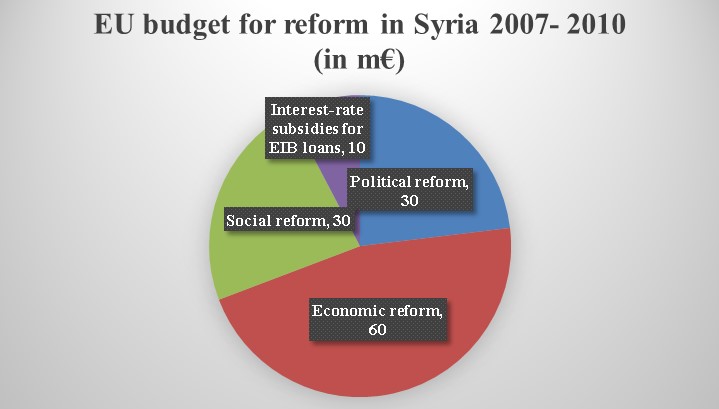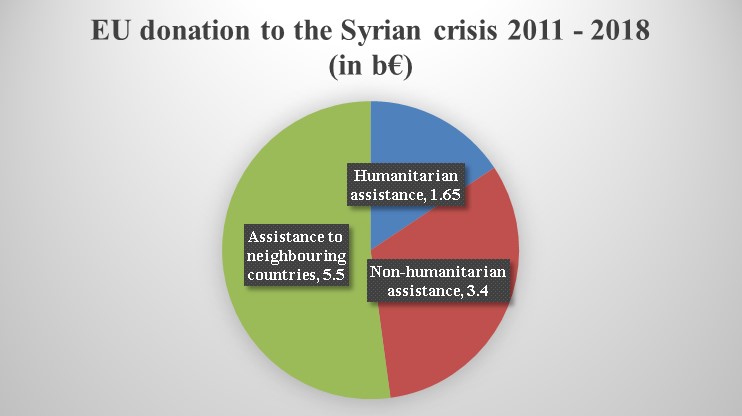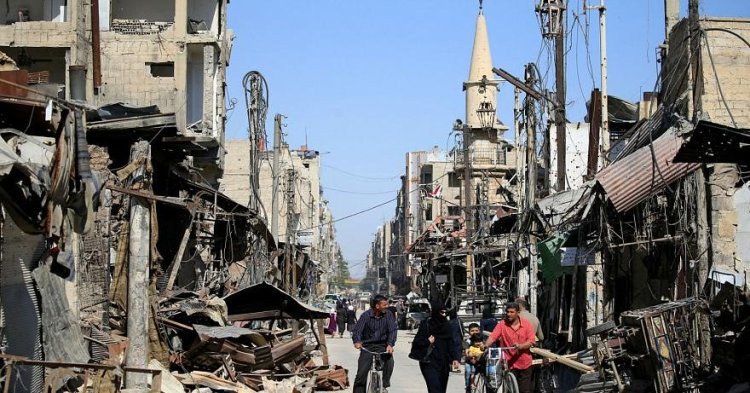The historical context of the relations between the EU and Syria
In 2008, through several bilateral agreements, Syria was part of the ENP (European Neighborhood Policy) but not as a full member. The EU seemed to be optimistic about the new young Syrian president, Bachar Al-Assad, who promised in his inauguration speech of 2000 to reform the country politically, emphasizing the importance of human rights and freedom of speech.
This led to a strong trade relationship between the EU and Syria, but this was later diminished due to several factors. According to Peter Seeberg, policy analyst, Syria found alternative dominant trading partners to the EU without disturbing the relation with the latter. However, according to The Country Strategy Paper (CSP) drafted under the European Neighborhood and Partnership Instrument (ENPI), the EU allocated around €130m for political, economic, and social reform in Syria between 2007-2010, as shown in figure 1.
Figure 1 EU budget for reform in Syria 2007-2010

In March 2011, the uprising broke out in Syria, demanding democracy and a respect for human rights. Two months later, the EU had its first response to the Syrian regime’s brutality against civilians. It suspended all the bilateral agreements with Syria, including the ENP. Moreover, the EU replaced these cooperative relations by unilateral targeted restrictive measures.
Since one of the ENP’s concepts is partnership, the EU aimed at replacing it, especially with regard to Syria, and turned to using its influence as a stick and carrot policy. The objective at that moment was to show the EU’s commitment to the promotion of democracy and human rights as well as to restrict the ability of the Syrian regime to finance its oppressive approach towards the protests. In addition, the EU aimed at coercing the Syrian regime into changing its brutal behavior into a more democratic approach.
“We will forget that there is Europe on the map”, responded the Syrian foreign minister, Waleed Al-Moalem, in 2011. The EU’s measures toward the Syrian regime surely put pressure on the latter in terms of economy and diplomacy, but at the same time, they limited Europe’s tools in relation to influencing, since Syria has the option of turning towards other economic partners.
Similar to what happened prior to 2011, when the trade relations were diminished, the Syrian regime looked “eastward and westward”, as expressed by the minister in 2011. Since then, the historical relations between Syria and both Iran and Russia have been fostered. “We are expecting much more support from friendly countries… Yes, financial support from Iran and Russia and it could also be from other friendly countries.” Said Adeeb Mayaleh, the Syrian central bank governor in 2013.
Iran’s influence in Syria
Since the complete retreat of the EU from Syria, Iran was the first country to expand its influence in the country and to fill the vacuum. In 2013, Tehran officially expressed that the aim of overthrowing al-Assad in Syria is part of a foreign agenda against Iran. “Foreign adversaries such as the US and the Zionists, who are sworn enemies of the [Islamic] Revolution [of Iran], and certain Arab countries, as well as Turkey, are mounting pressure on Syria to overthrow its government before Iran’s election,” Major General Yahya Rahim-Safavi stated, a senior military adviser of the Leader of the Islamic Revolution, Ayatollah Seyyed Ali Khamenei. Through this speech, Tehran expressed its full support for Al-Assad.
In addition to the annual trade, amounting to approximately 700 million USD, and the financial aid that reached more than 3 billion USD only in 2013, Iran also provided military aid to Syria. According to Karim Sadjadpour, a policy analyst, “Tehran has helped create a 50,000 strong Syrian paramilitary group known as Jaysh al-Shabi (The People’s Army) to aid Syrian government forces”.
Russia’s influence in Syria
Austria and Germany stopped supplying Syria with banknotes as a result of the EU sanctions, but according to Adeeb Mayaleh, Russia quickly replaced them. Russia also attempted to replace the role of the EU in Syria and to further fill the vacuum. “Turning the de-escalation zones into humanitarian support zones is an opportunity,” said Grigory Lukyanov, an expert on Russian foreign policy and conflicts. In other words, Russia was involved in Syria’s economy by also delivering humanitarian aid to the Syrian people. As expressed by the Financial Times, “policymakers in Moscow want to secure the peace by winning over hearts and minds.”
With regards to the Russian military intervention in Syria, Riad Haddad, Syria’s Ambassador to Russia, affirmed: “Yes, we receive arms, military equipment, all this is done in line with agreements sealed between our countries”. Officially, Moscow interfered in the war in Syria since 2015, following the request of the Syrian government. Russia built an airbase in Syria named Khmeimim, and started aerial bombardments against opposition-controlled areas in Syria.
Both Iran and Russia found their ways to foster their existence in Syria as a consequence of the retreat of the EU. Also, both of them, with the help of Hezbollah, a Lebanese militia, prevented the collapse of the Syrian regime and helped to reestablish governmental control over most of the Syrian territories. As such, the Syrian regime increased its violation of Human Rights, and the breach of International law. Since the EU’s sanctions were implemented on Syria and the European countries withdrew their embassies, the Syrian regime was able to cross all the red lines, especially because it was not isolated, as the EU hoped it would be.
The EU response to the Syrian crisis
According to the UN High Commissioner for Refugees (UNHCR), more than 5 million Syrians found refuge in neighboring countries, and according to reliefweb, “In 2015 and 2016, Europe became a destination of choice for an estimated 650,000 Syrians. However, this represents only about 5% of all Syrians displaced by the conflict worldwide.”
The EU determined its strategy in response to the Syrian crisis in different fields, and allocated over €10.6 billion (figure 2) for humanitarian and development assistance since the start of the conflict. In addition to the humanitarian and non-humanitarian assistance, as well as the hosting and resettlement of refugees in Europe, the EU has been engaged politically in Syria through, primarily, supporting the negotiations in Geneva between the regime and oppositions, supporting Syrian political opposition groups, and supporting civil society organizations.
Figure 2 EU donation to the Syrian crisis of 2011 - 2018

The figure 2 shows that more than half of the allocated budget went to the neighboring countries, representing the EU’s contribution and response to the Syrian crisis in these countries. However, when comparing figure 1 and figure 2, the EU’s budget concerning Syria, one can see that it was raised from €130m for five years to €10.6b for seven years. While the budget prior to the conflict in Syria was dedicated to political, economic, and social reform, the budget since 2011 was mostly for security and humanitarian issues.
Also, Europe witnessed several terrorist attacks sponsored by the Islamic State (IS), a Salafist-jihadist non-state actor that emerged in 2014 and which took control over large territories in Syria and Iraq. As a result of the increase in illegal human smuggling to Europe, combined with the growing number of terrorist attacks, the EU was obliged to review the ENP in 2015. In this review, there was an emphasis on adopting an approach focusing on security and stability in the region.
Conclusion
The ENP was the EU’s policy meant to promote democracy and human rights in neighboring countries as well as to prosper their economies. It was the EU’s main leverage, as a political and economic instrument, to be used against the atrocities of the authoritarian regimes in the southern neighborhood area. However, suspending this policy, or the act of considering it as a stick or treat for these regimes, transformed the EU into a responsive political actor that is only able to solve problems in a case-by-case approach.
Regarding Syria, the European retreat fostered the role of EU adversaries, Iran and Russia, in the country. Also, it worsened the human rights situation in Syria by giving the floor to the Syrian regime to cross all lines with the full support of its allies.
Finally, the EU was forced to deal with emerging threats tactically, instead of having a strategic plan. The EU found itself in front of one of the most severe humanitarian crisis of the 21st century. It was put in the position of finding solutions to the rising number of refugees who headed towards Europe. Moreover, the EU was obliged to develop security policies to tackle the emerging threats. In other words, the role of the EU transformed from being an influential actor to a responsive one with regard to the consequences of the Syrian crisis.


Follow the comments: |
|
